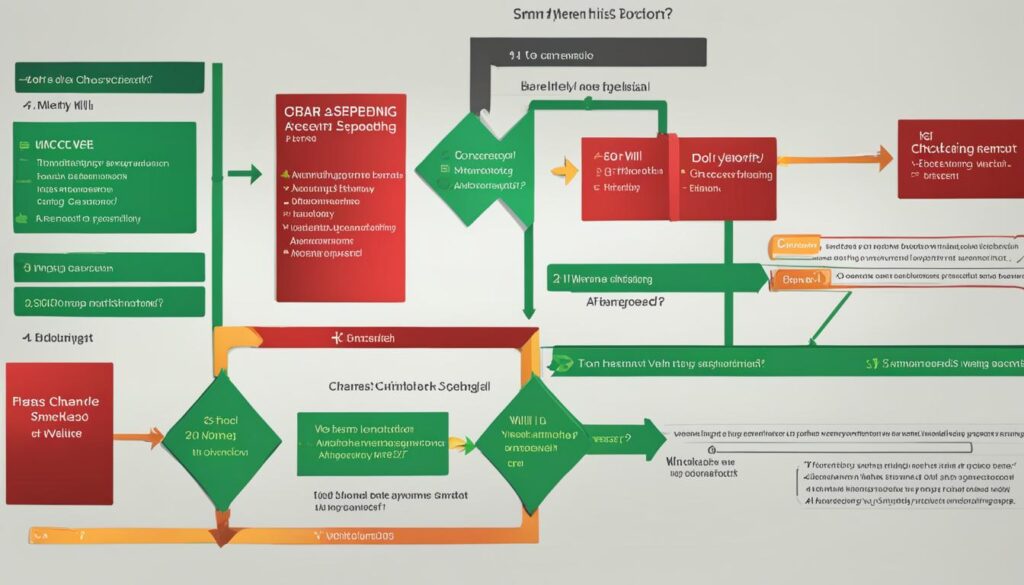Smart spenders understand the importance of asking themselves key questions before making a purchase. These questions help them make informed decisions, maximize their budget, and avoid unnecessary debt. By considering these questions, individuals can develop smart spending habits that lead to financial optimization and freedom.
Lynnette Khalfani-Cox, The Money Coach®, shares two important questions she asks herself before buying something: Should I put this on a card or should I just use cash to buy it? If I’m going to charge something, do I have the ability to pay the balance off in full or in a rapid time frame? These questions form the foundation of Khalfani-Cox’s “Zero Debt mindset” and enable her to make better financial choices.
Key Takeaways:
- Asking key questions before making a purchase helps smart spenders make informed decisions and avoid unnecessary debt.
- Two important questions to ask are whether to put the purchase on a card or use cash and whether there is the ability to pay off the balance quickly.
- These questions form the foundation of a “Zero Debt mindset” and help individuals make better financial choices.
- Smart spending involves considering factors such as money-saving tips, budgeting advice, comparison shopping, product research, cost-effective buying, and value for money.
- Financial planning and purchase decision-making are essential for optimizing budgets and achieving financial freedom.
Should I put this on a card or should I just use cash to buy it?
When it comes to making everyday purchases, the decision to use cash or credit is a personal one. While some people prefer the tangible nature of cash as a way to control their spending, others find comfort in using credit cards, knowing they won’t exceed their means. It’s a choice that prompts a deeper consideration of your money management style.
For personal finance expert Lynnette Khalfani-Cox, the question serves as a reminder of how she relied on credit as a crutch when she was in debt. However, when used thoughtfully, credit cards can be valuable tools to help manage your finances effectively. They can offer rewards or cash-back incentives, enable timely bill payments, and contribute to better budget management.
Ultimately, the answer to this question depends on your financial situation and spending habits. If you have a strong ability to control your spending and pay off credit card balances promptly, credit cards can provide additional benefits. On the other hand, if you prefer the simplicity and visual representation of cash, it can be an effective way to stay within your budget.
“I think that credit cards are valuable financial tools when used properly.”
Here is an example illustrating the different considerations between using cash and credit:
| Cash | Credit | |
|---|---|---|
| Controlling Spending | Physical cash provides a clear visual representation of your available funds. | Credit cards can lead to impulsive spending if not managed carefully. |
| Credit Card Rewards | N/A | Credit cards often offer rewards or cash-back incentives for eligible purchases. |
| Budget Management | Using cash helps you stay within your budget, as you can only spend what you have. | Credit cards require disciplined budget management to ensure timely payments and avoid accumulating debt. |
As we can see, there are pros and cons to both cash and credit. Considering your financial goals, spending habits, and ability to control your budget will help determine which method best suits your needs.
If I’m going to charge something, do I have the ability to pay the balance off in full or within a rapid time frame?
The second question smart spenders ask themselves is whether they have the ability to pay off the balance in full or within a rapid time frame if they choose to charge the purchase. Carrying a balance on your credit card month to month can be expensive and detrimental to your financial health. For Khalfani-Cox, excessive spending was the root cause of her high debt. She tackled this by doubling and tripling her credit card payments. Paying more than the minimum allows you to chip away at your principal balance and reduce interest costs. If immediate repayment is not feasible, consider using a credit card with a zero-interest introductory period for new purchases. However, be mindful of maintaining good to excellent credit scores to qualify for such cards.
| Credit Card Debt | Minimum Payments | Aggressive Payoff Plan | Zero-Interest Introductory Period | Credit Scores |
|---|---|---|---|---|
| High credit card debt can lead to financial stress and long-term consequences. | Paying only the minimum can keep you in debt for years, accumulating more interest. | An aggressive payoff plan involves paying more than the minimum to reduce the principal balance. | A credit card with a zero-interest introductory period can provide a window to pay off the balance without accruing interest. | Maintaining good to excellent credit scores increases your chances of qualifying for beneficial financial products. |
To effectively manage credit card debt, it’s crucial to assess your ability to pay off the balance promptly or within a rapid time frame. Carrying a balance can be financially burdensome and hinder your progress towards financial goals. By prioritizing aggressive repayment strategies and taking advantage of zero-interest introductory periods, you can take control of your debt and improve your credit scores. Responsible credit card usage coupled with minimizing debt can lead to financial stability and long-term financial success.

Five questions to ask before making a purchase
Making thoughtful purchasing decisions is essential to avoid impulse buying and its negative consequences. It’s important for smart spenders to ask themselves five key questions before making a purchase:
- Is it a need or a want? Determine if the purchase fulfills a genuine need or if it’s just something you want. If it satisfies an essential requirement, you can proceed with the purchase. However, if it falls under the category of a want, it’s worth considering the true cost beyond the price tag.
- What is the true cost? Look beyond the initial price and consider how the purchase will impact your financial situation. Will it affect bill payments or your ability to save? Will you have to rely on credit to make the purchase? Evaluating the true cost helps you make an informed decision and avoid unnecessary financial strain.
- Will it bring long-term satisfaction? Think about how long the happiness or enjoyment from the purchase will last. Consider whether the satisfaction is temporary or if it will provide long-term value. This assessment helps you prioritize purchases that have a lasting impact on your well-being and minimize those that offer only short-term gratification.
- What are your underlying motivations? Reflect on the reasons behind your desire to make the purchase. Are you buying out of genuine necessity, or are there other motivations at play, such as social pressure or emotional fulfillment? Understanding your motivations helps you make more conscious choices and avoid unnecessary purchases driven by external factors.
- Are there alternative sources of joy? Explore alternative ways to find joy and satisfaction that don’t require a purchase. Think about activities or experiences that can provide a similar level of happiness without the need to spend money. This exercise encourages creativity and helps you redirect your focus towards fulfilling alternatives.
By answering these five questions, you can make more deliberate and informed purchasing decisions, avoiding impulsive buying and finding long-term satisfaction. Remember, being a smart spender means considering not only the immediate gratification of a purchase but also its true cost and impact on your overall financial well-being.
| Question | Key Points |
|---|---|
| Is it a need or a want? | Determine if the purchase fulfills a genuine need or if it’s just a want. Prioritize essential requirements over discretionary wants. |
| What is the true cost? | Look beyond the price tag and consider the financial impact of the purchase. Assess how it will affect your bills, savings, and whether it requires reliance on credit. |
| Will it bring long-term satisfaction? | Evaluate the duration of happiness the purchase will provide. Consider the long-term value and impact on your overall well-being. |
| What are your underlying motivations? | Reflect on the reasons driving your desire to make the purchase. Assess if they align with your genuine needs and values. |
| Are there alternative sources of joy? | Explore non-consumerist alternatives that provide satisfaction and joy without the need for a purchase. Encourage creativity and resourcefulness. |

The financial flowchart for smart spending decisions
A financial flowchart can be a valuable tool for smart spenders to make informed decisions and prioritize their financial goals. By following a structured decision-making process, individuals can effectively manage their debt, compare options, and borrow responsibly. The financial flowchart outlined below offers a step-by-step guide to help individuals navigate their financial priorities and make sound spending choices.
Determining Necessities vs. Wants
Before making a purchase, it is crucial to evaluate whether it is a necessity or a want. Necessities like food, housing, and healthcare should be given top priority, as they are essential for basic living. Wants, on the other hand, can be adjusted or postponed when necessary to align with overall financial priorities.
Evaluating Financial Health
The next step in the financial flowchart is to assess the current state of one’s finances. This involves analyzing debt levels, managing repayment plans, and ensuring regular savings contributions. Responsible debt management plays a significant role in maintaining financial stability and minimizing the impact of interest payments.
Exploring Cost-Reduction Options
Comparison shopping is an essential aspect of smart spending. The financial flowchart encourages individuals to explore various options and vendors to find the most cost-effective solution. By taking the time to research and compare prices, individuals can make better-informed decisions and potentially save money.
Responsible Borrowing Considerations
When borrowing is necessary, responsible borrowing is crucial to ensure long-term financial well-being. Smart spenders should carefully evaluate the terms and conditions of borrowing options, such as interest rates, repayment terms, and potential impact on their overall debt. This assessment helps individuals make informed decisions and avoid excessive debt burdens.
Reflecting on Financial Goals and Values
Lastly, the financial flowchart recommends reflecting on individual financial goals and values before making a purchase. This step ensures that the decision aligns with long-term financial aspirations and personal values. Taking a moment to consider the implications of the purchase on one’s financial future can help foster responsible decision-making and maintain financial stability.
By following the financial flowchart for smart spending decisions, individuals can take a systematic approach to their purchasing choices. Prioritizing financial needs, managing debt effectively, comparison shopping, considering responsible borrowing, and aligning decisions with long-term goals are essential elements of a successful decision-making process. Incorporating these strategies into everyday spending habits can lead to improved financial security and a more prosperous future.

How Can Smart Spenders Avoid Falling into the Impulse Purchase Cycle Mentality?
Smart spenders can avoid the impulse purchase cycle mindset by creating a budget and sticking to it. They can also make a list before shopping and only buy what’s on it. It’s important to take a moment to pause and consider if the purchase is necessary before making it.
Conclusion
By practicing smart spending habits and incorporating financial mindfulness into their daily lives, individuals can make informed decisions and optimize their budgets to achieve financial freedom. It starts with asking critical questions before making a purchase, such as considering the payment method and the ability to repay the amount. Alongside that, understanding the overall costs and long-term satisfaction play a crucial role in making thoughtful choices.
Developing informed decision-making skills helps individuals become more intentional with their purchases, ensuring they align with their financial goals and values. By cultivating a disciplined approach to spending, individuals can prioritize their financial well-being and actively reduce debt. Additionally, by developing a comprehensive budget optimization strategy, individuals can effectively plan their finances and achieve greater financial freedom.
Investing time and effort into understanding personal financial situations and implementing informed decision-making processes enable individuals to make the most of their resources and stay on track towards their financial goals. By maintaining smart spending habits and engaging in continuous financial education, individuals can pave the way to a more secure and prosperous future.
FAQ
What do smart spenders ask themselves before purchasing?
Smart spenders ask themselves key questions before making a purchase to make informed decisions, maximize their budget, and avoid unnecessary debt.
Should I put this on a card or should I just use cash to buy it?
Whether to use cash or credit for everyday purchases is a personal choice. Some people prefer using physical cash to control their spending, while others are comfortable using credit cards if they know they won’t spend beyond their means.
If I’m going to charge something, do I have the ability to pay the balance off in full or within a rapid time frame?
Carrying a balance on your credit card month to month can be expensive and detrimental to your financial health. Smart spenders evaluate their ability to pay off the balance in full or within a rapid time frame before charging a purchase.
What are five questions to ask before making a purchase?
Smart spenders ask themselves if the purchase is a need or a want, consider the true cost beyond the price tag, evaluate the potential duration of happiness the purchase will bring, explore the underlying motivations behind it, and consider alternative sources of joy that may provide a similar level of satisfaction without the need for a purchase.
What is the financial flowchart for smart spending decisions?
The financial flowchart helps smart spenders make informed decisions by assessing if the purchase is a necessity or a want, evaluating their financial control, considering options to reduce the cost, and reflecting on the decision to ensure it aligns with their financial goals and values.
How can asking smart spenders’ questions before purchasing lead to better financial habits?
By asking themselves smart spenders’ questions before making a purchase, individuals can cultivate financial mindfulness, make informed decisions, and optimize their budgets. These habits can lead to better financial planning, reduce debt, and increase overall financial freedom.

